Last Updated on June 5, 2024 by Leslie Stroud
As experienced travelers to over 35 countries with five kids in tow, we did not expect our couple’s trip to Morocco would surprise us. We knew what we were doing, after all!
Morocco not only surprised us but also left us craving a return trip before we even left. We could not see all we wanted in our short 7-day trip, but we covered a lot of ground and drove over 35 hours to see as much as possible.
We cannot wait to return with our five kids and explore this fantastic country!
Morocco also made us feel a little bit like travel newbies. We’ve experienced a lot of countries from Asia to South America, but it took us a little to adjust to Morocco. I want to share 13 essential tips:
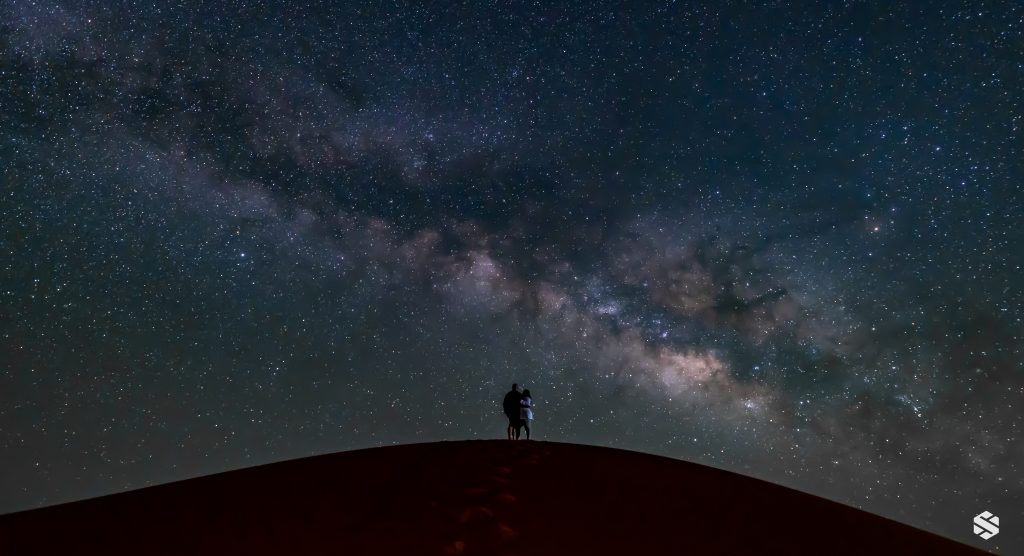
*Disclaimer: This post may contain affiliate links. Opinions shared are my own, and I only endorse products I support. By clicking on any of the links below, I may get a small commission if you purchase at absolutely no additional charge to you. I appreciate your support.*
Table of Contents
- 1 1. Know Some Of Their Local Terminologies
- 2 2. Bring Your Barter Game
- 3 3. Prepare For A Lot Of Driving
- 4 4. Appreciate The Local Religion
- 5 5. It’s Hot! And Cold!
- 6 6. Rehydrate!
- 7 7. Get Excited For The Local Food And Mint Tea
- 8 8. Break Out Your Language Skills
- 9 9. Cash Is King
- 10 10. You Need To Pay To Use The Bathroom
- 11 11. Grab a SIM Card ASAP
- 12 12. Be Careful With The Camera
- 13 13. Leave The Drones At Home
- 14 Other Interesting Facts To Know About Morocco
- 15 Where To Stay On Your Visit To Morocco
- 16 Additional Reading
1. Know Some Of Their Local Terminologies
As with all foreign countries, knowing some local words goes a long way to making your trip more successful and giving the locals more reasons to like you. 🙂
Here are some basic local words to learn before visiting Morocco:
Shukran
It means “Thank you.”
La, shukran
It means, “No, thank you.” This one is important in the souks! You’ll need it with the vendors, many of which can be pretty aggressive (more details below).
Riad
Is a large family home, many turned into hotels, with a gorgeous inner courtyard. Plenty has gardens and pools. The Arabic tradition is to have a simple and plain look of homes on the outside and incredible details on the inside.
Dar
Means “Home”
Souk
Shopping stalls or shopping areas
Medina
An old part of the city and a must-see. It’s typically walled and has narrow streets, palaces, and mosques. Beware, it’s often effortless to get lost here.
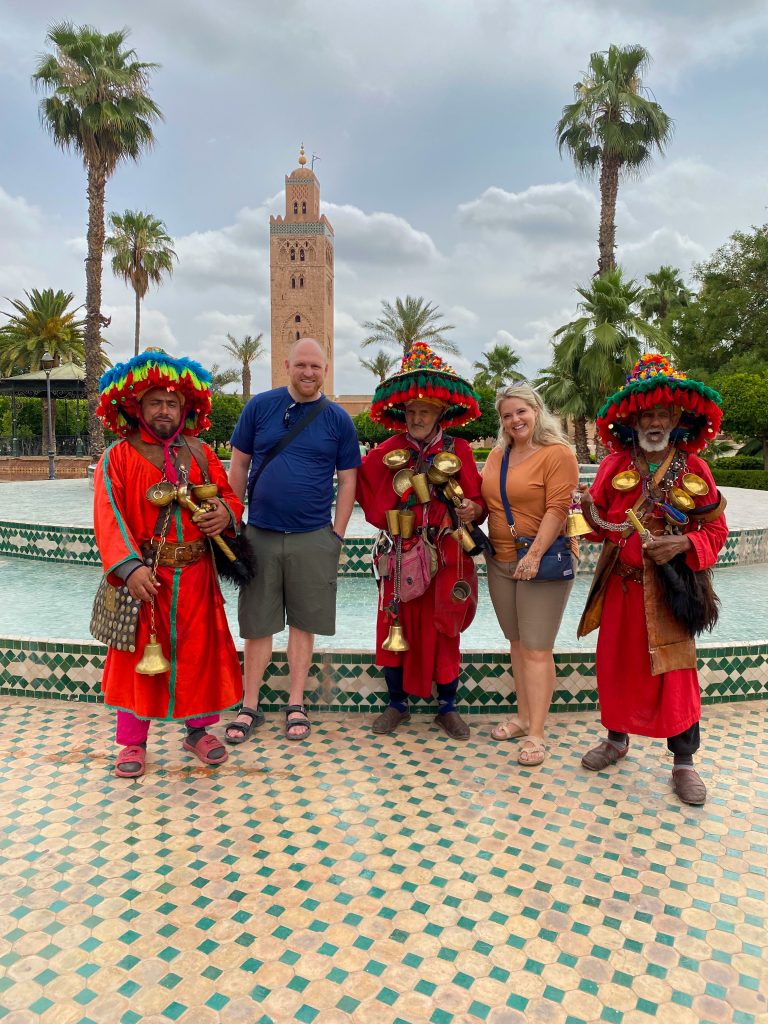
2. Bring Your Barter Game
Speaking of souks and shopping, prepare for the aggressive nature of street vendors. While I’ve heard Egypt can be much worse, Marrakech vendors are in it to win it. They may follow you down the street, even offer to let you stay in their home, lie through their teeth, promise you are getting the best deal, pass you to another vendor, etc. You must know how to barter!
Bartering is something we are still perfecting, but here’s what to remember:
- Scout around before committing to anything. The more you walk around, the more you’ll see repeated items. You can get a better idea of anything unique and what you might want to purchase instead.
- 90% of the time, you will not see prices which is very intentional. They will 100% charge you more as a tourist and immediately take a reading on what they think you will pay.
- If you want something, you must also be willing to walk away from it! Ask the price, but don’t commit instantly.
- Offer around half (or maybe less) of the quoted price. The vendor will undoubtedly get upset and pretend you’ve wounded him. When that happens, you should act aloof.
- Barter back and forth and see if you can find a price you both agree on. If not, walk away, and you’ll find the item elsewhere. If you don’t, you can always go back.
- Note that almost all vendors want cash.
- Sometimes I felt guilty bartering, but you shouldn’t. The vendor will not sell you an item he isn’t willing to. They have no problem trying to get more of your money. You can stand up for yourself without guilt.
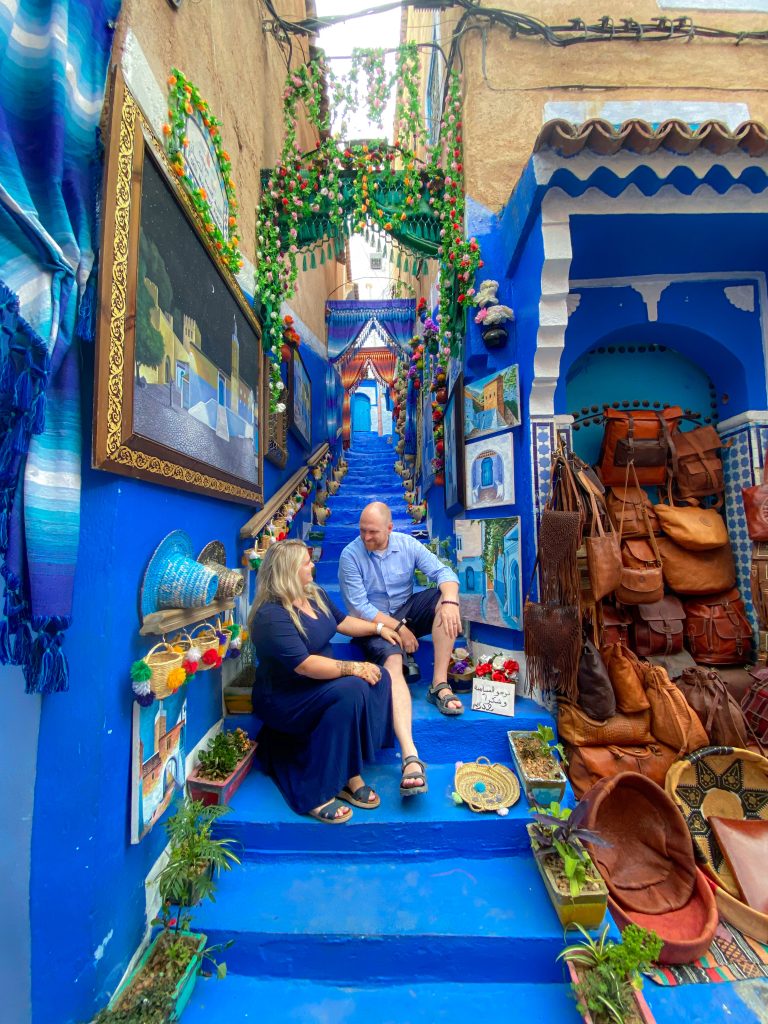
3. Prepare For A Lot Of Driving
You may not try to pack as much of Morocco into a short period as we did on our 7-day itinerary, but we drove over 35 hours. We have driven around several adventurous countries, like Costa Rica and Brazil, but I was glad daily for our driver and guide, Idir!
Morocco has some crazy driving in the cities, but also long, long stretches of driving between sites. It was nice to relax, use your hotspot and check emails, or even do work calls onboard an air-conditioned van.
Additionally, you’ll need to cross the Atlas Mountains to go to the Sahara, and the roads can be pretty narrow. The government is widening the pass due to several accidents, including a bus falling off the mountain. I’m glad we took a driver to navigate these roads for us.
Are you thinking about driving instead of hiring a driver? It’s possible! Learn some tips from other bloggers like this one who drove in Morocco.
You can also check out our tour company if you want a driver. They can plan your itinerary, or you create your own.
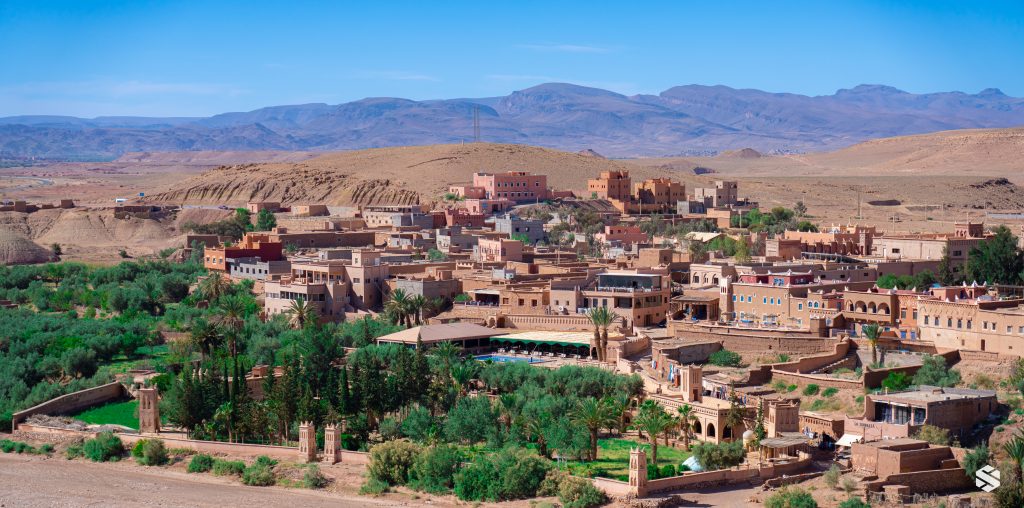
4. Appreciate The Local Religion
Moroccans are very religious. They practice Islam, and you will hear prayers announced five times a day (sunrise, morning, mid-day, late afternoon, and sunset. These prayer times change based on the time of year and the time the sun rises and sets).
Each city has multiple mosques, each with a siren for prayers and a megaphone for the leader to recite the prayers.
Other things to know:
There’s only one mosque where non-Islam can enter, and that is in Casablanca.
Public PDA is kind of a no-no. You probably won’t be bothered as a foreigner, but we tried to be respectful and not do much more than hold hands in public. I don’t recommend making out in the park. 🙂
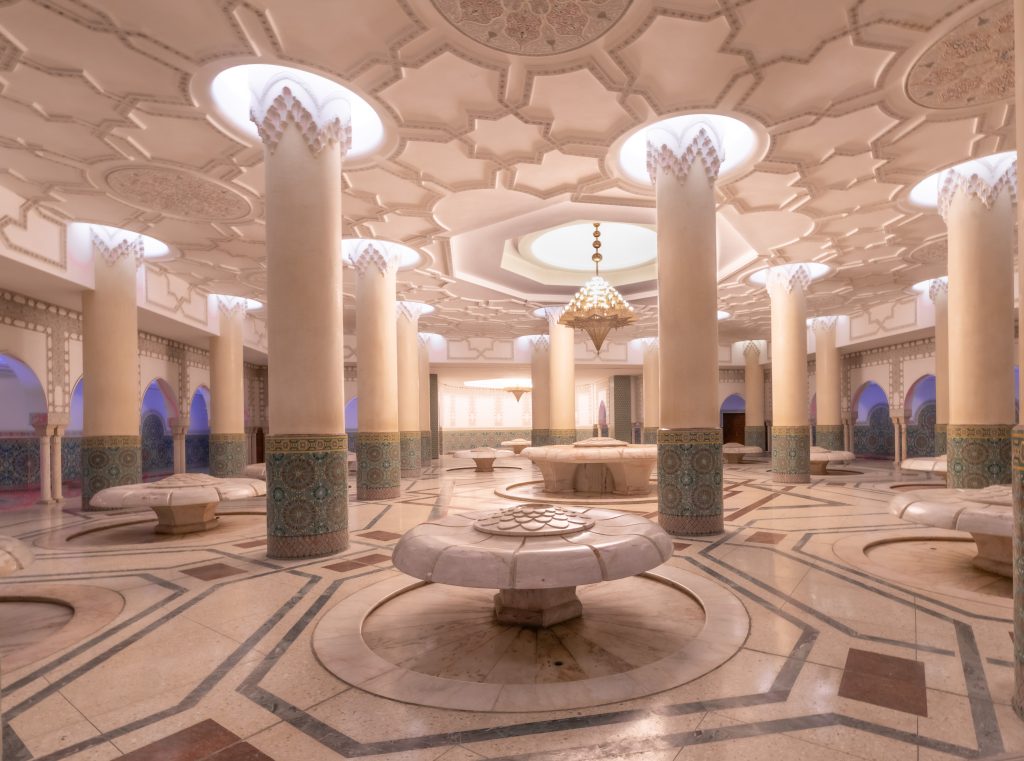
In sacred areas, it is respectful to wear sleeves and bottoms past the knee. I’d recommend dresses or a shawl.
Know that alcohol is prohibited, as is sleeping together before marriage. It can be hard to find alcohol, and technically, sharing a hotel room romantically with someone who’s not your spouse is illegal.
Again, as foreigners, you’ll be able to find alcohol if you want (we don’t drink, so this didn’t bother us!) and probably won’t be asked if you are married unless one of you is Moroccan.
Islam forbids the consumption of pigs. Don’t expect to order pork chops for dinner unless you are at a restaurant totally geared to tourists.
5. It’s Hot! And Cold!
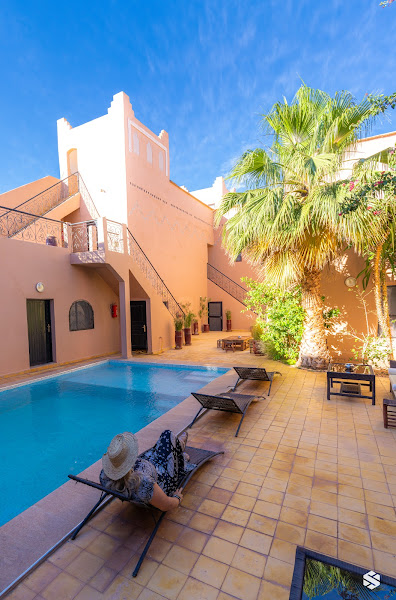
This might seem common sense as you’re headed to a desert area, but you must also prepare for the heat and the cold.
It can be pretty cold in winter while summer is blistering. Temperatures in summer can exceed 120F (40 degrees C).
In winter, finding a place to warm yourself can be difficult. Consider some hand and foot warmers in addition to your other winter gear.
Check the weather and pack accordingly, drink LOTS of water, and don’t overdo it. Layers are your friend and know you can go shopping there for what you might forget.
I’ll write up a packing list later, but here are some essentials to remember:
- Lifestraw water bottle so you can drink from the tap
- Shawl or long scarf for covering up and a turban in the Sahara
- Jackets, pants, skirts, and dresses for versatility
- Secure travel purses because theft is common. I love this travel purse!
- ATM card to get more cash
- Sunscreen
- Electrolyte packets. Getting tummy bugs can be common.
- Portable charger
- Hotspot device. This can be your phone (if unlocked) or a hotspot device that accepts SIM cards.
- Good walking shoes. Include a pair of sandals as well as closed-toed shoes for the desert.
- Sunglasses
- Travel pillow for long drives
- Camera and extra memory cards. Your camera will be heaven!
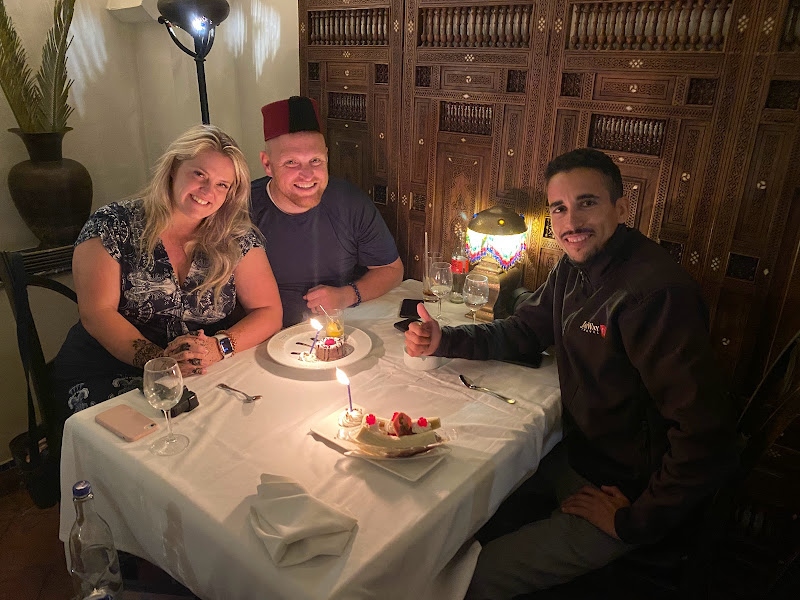
6. Rehydrate!
Speaking of water, stick to bottled water for drinking. While the city water is safe for locals, it will likely make you sick. As a backup, we were grateful to have a Lifestraw water bottle, so we could always drink the tap water between finding more bottled.
Depending on where you are coming from (we currently live at sea level in Portugal), you might experience a bit of altitude sickness. The Atlas mountains stand impressively tall. One of the best cures for this is to stay well hydrated.
7. Get Excited For The Local Food And Mint Tea
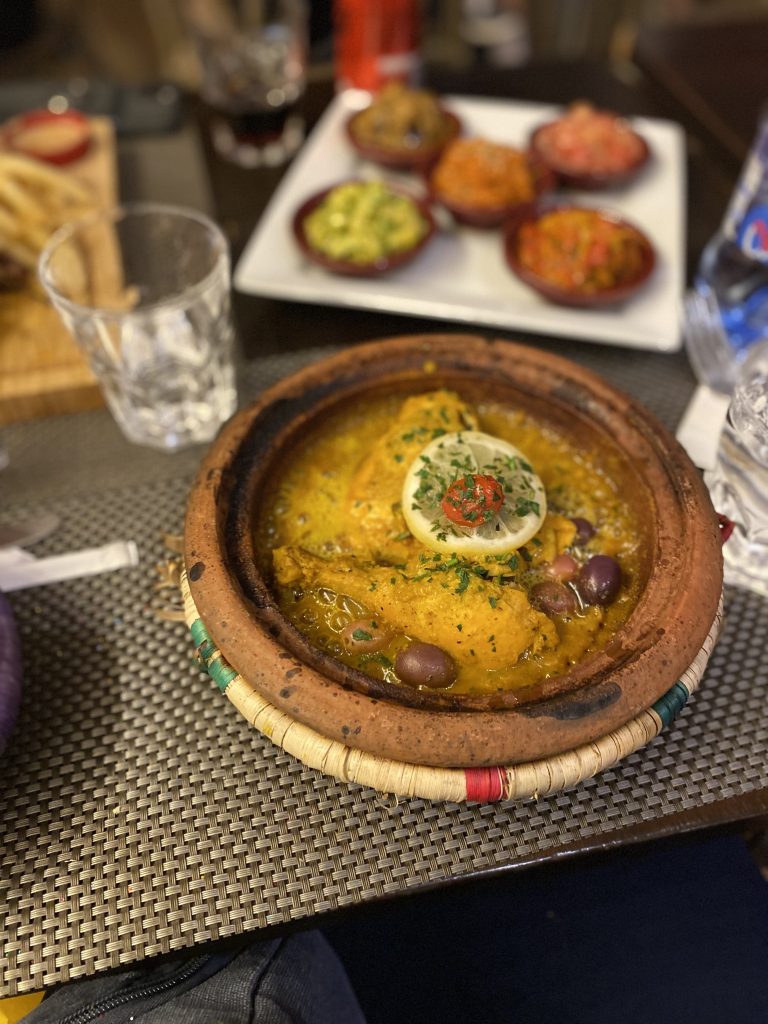
If you aren’t already familiar with tangine, you will be after your trip! We ate this at almost every meal.
The meat choice for tangine varies, but it is meat with vegetables roasted in a clay or ceramic tangine pot at extremely hot temperatures. The flavors are unique and get even better when eaten with local Moroccan bread. Often, it is served with couscous.
Another favorite was lemon chicken. Very tasty!
Other typical dishes are couscous with meats and vegetables and Tanjir (which I loved too!!). It’s a slow-roasted lamb dish with saffron and cumin.
On one of our long drives, we had a fantastic lamb BBQ in the middle of nowhere. We could never have eaten there without our tour guide, Idir.
Mint tea will be your primary choice of drink. Also known as “Berber Whiskey,” this tea comes with sugar and can also be without. I loved it and drank gallons, even in the heat! I’d recommend trying it a few times.
In smaller hotels, you’ll be expected to sit and enjoy tea while you learn about the hotel.
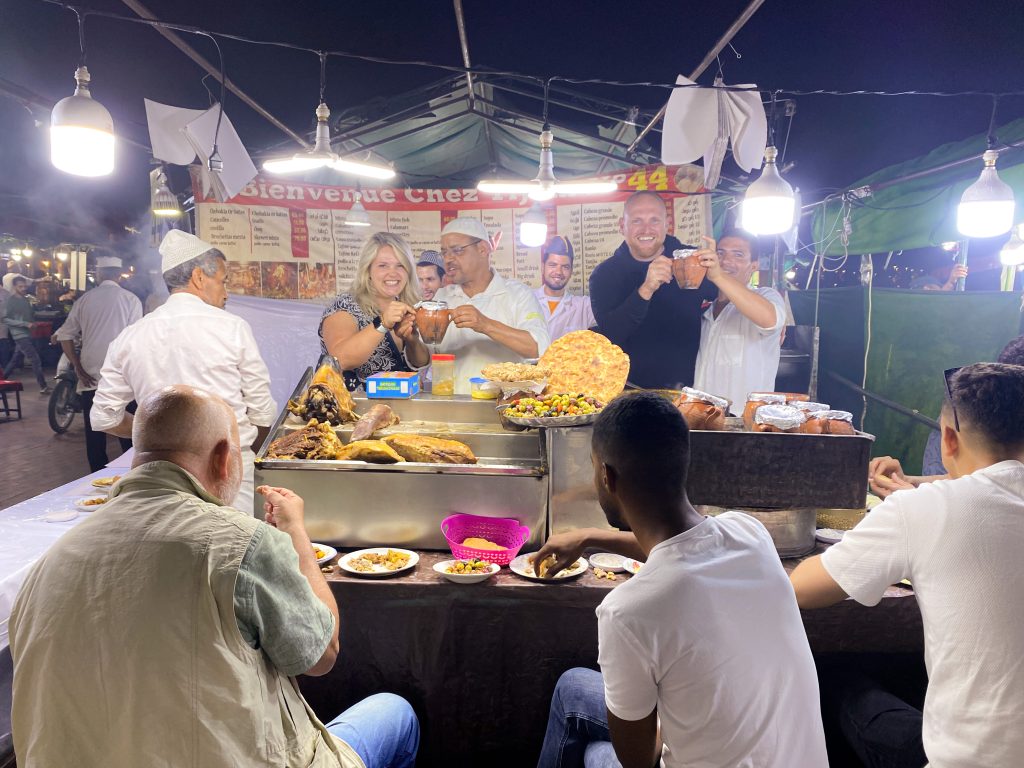
What you won’t find a lot of is dessert! Often you’ll get a simple fruit plate which is a very healthy option.
Here are foods you should avoid:
- Lettuce or other fruits and veggies that are not peeled or cooked.
- Street pastries. While delicious, they made us a little sick when we bought some in Chefchaouen. Instead, find a busy bakery like Patisserie des Princes in Marrakesh. They sell items quickly and don’t allow them to sit in the sun.
- Street cart food. It can be some of the best food there, but tourists don’t have the gut bacteria to handle a curveball here.
8. Break Out Your Language Skills
The primary languages of Morocco consist of Berber, Arabic, and French, in order of predominance.
Berber vs. Arabic: Like many regions of the world, the indigenous people and the new culture messes and sometimes have conflicts. Berber people populated most of Northern Africa for thousands of years.
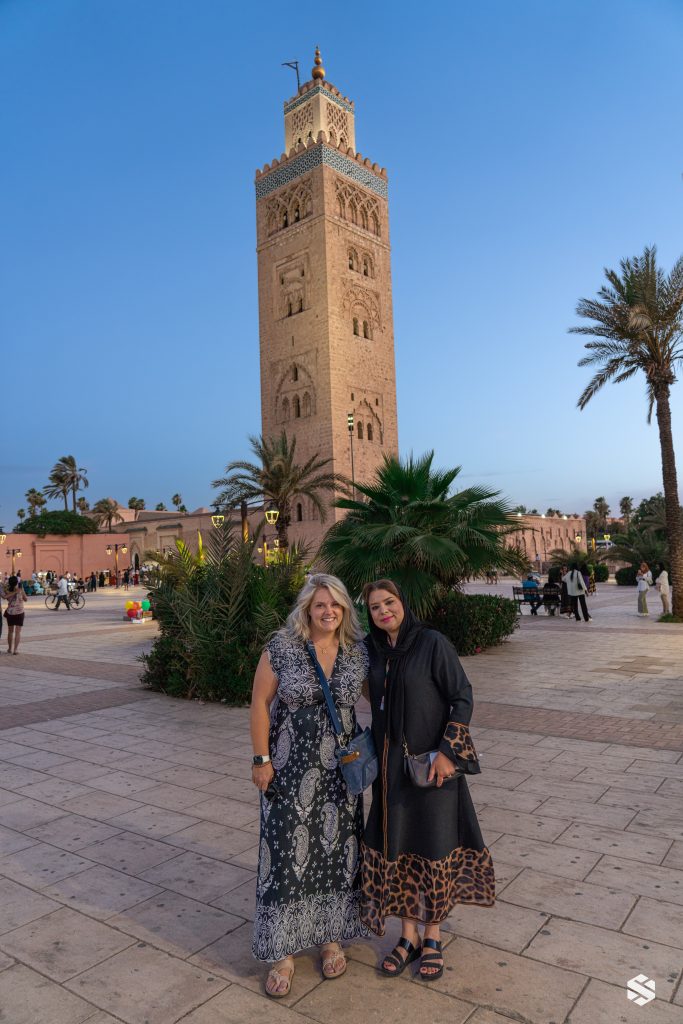
On the other hand, Arabic is more recent, along with French and Spanish occupations. As a result, almost everyone outside the cities speaks only Berber, and city people speak both Berber and Arabic, or Arabic only.
French is also an official language. English is not usual outside of those dealing with tourists.
9. Cash Is King
Morocco is a cash society. We rarely used our cards, even at some small riads.
Get cash immediately when you land at the airport by exchanging or withdrawing. We shopped A LOT and spent around €1000. Starting with €100-€200 should be more than enough.
Rarely, in larger cities, Euros will be accepted. Otherwise, it’s all the local dirham. The exchange rate is roughly around 10:1 for both USD and Euros.
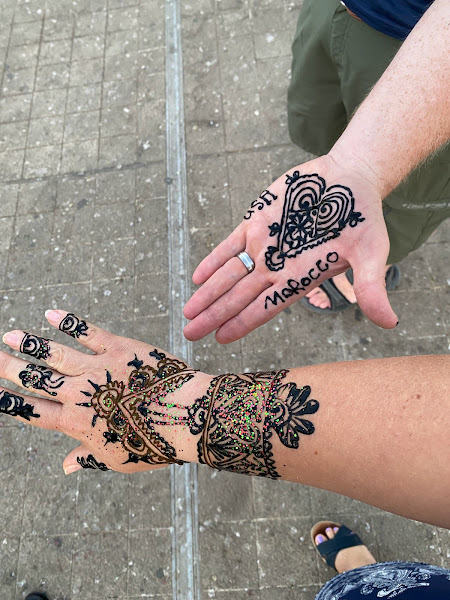
There are some quirky things about cash in Morocco. For example, a small change is really hard to find! Local vendors might be scrambling to cash your larger ATM bills.
Another good tip: only use an ATM attached to a bank (that is currently open) in case your card gets stuck in the machine.
10. You Need To Pay To Use The Bathroom
Speaking of small change, you need some to relieve yourself!
Your tour guide might spot this for you, but you’ll need small coins in every bathroom outside your hotel or restaurant. This is not uncommon worldwide, but it can be tricky when change is hard to find!
11. Grab a SIM Card ASAP
You’ll find vendors right after customs in the airport selling SIM cards. We got 20GB for €20. You can probably use your phone if you don’t have a hotspot device. Our newer iPhones would not accept the new SIM card because they are not unlocked, but our older versions (Portuguese phones) did.
Note that this will change your phone number. We still got iMessages, but any standard texts did not come through. WhatsApp still works with your original phone number.
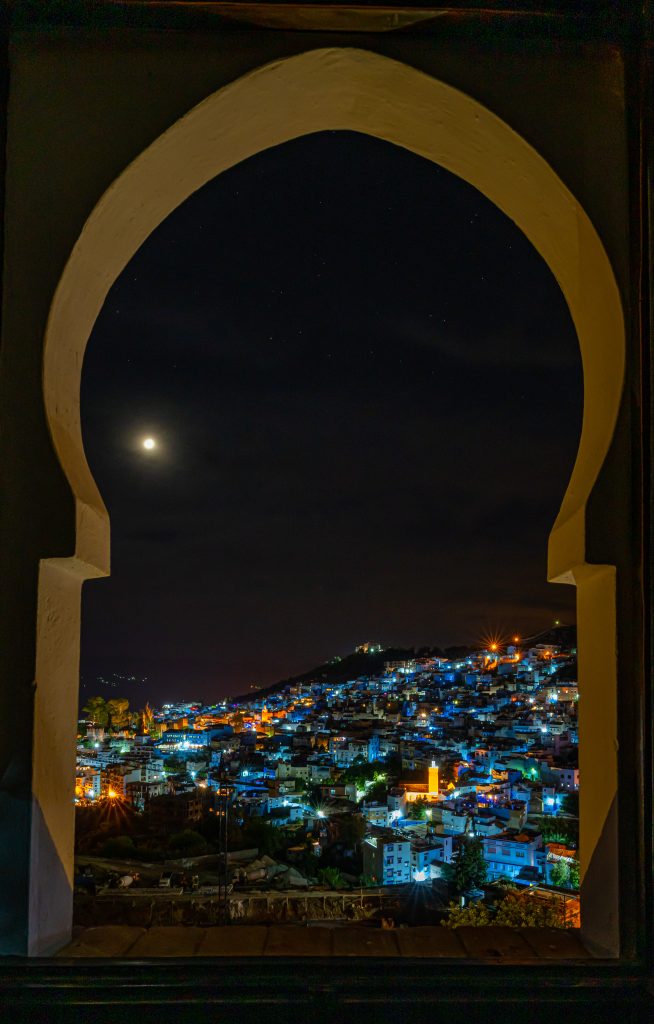
You will want some data in Morocco, and it’s super fast! We could do our zoom calls for work and connect almost anywhere in Morocco, even when driving. We did refill mid-week after long work days using lots of data.
You can recharge/reload your SIM cards at the tobacco shops in exchange for cash. You need to remember your phone number.
12. Be Careful With The Camera
Many Moroccans do NOT want their pictures taken. They can become upset and angry. This stems from a religious belief against creating human or animal images.
However, this does not apply to all Muslim countries but is quite prevalent in Morocco. A couple of women baking bread actively hid their faces from my phone until my guide politely told me they did not want their pictures taken. I felt pretty bad!
Also, some Moroccans find it offensive to photograph mosques. We didn’t find this on our trip, but be mindful.
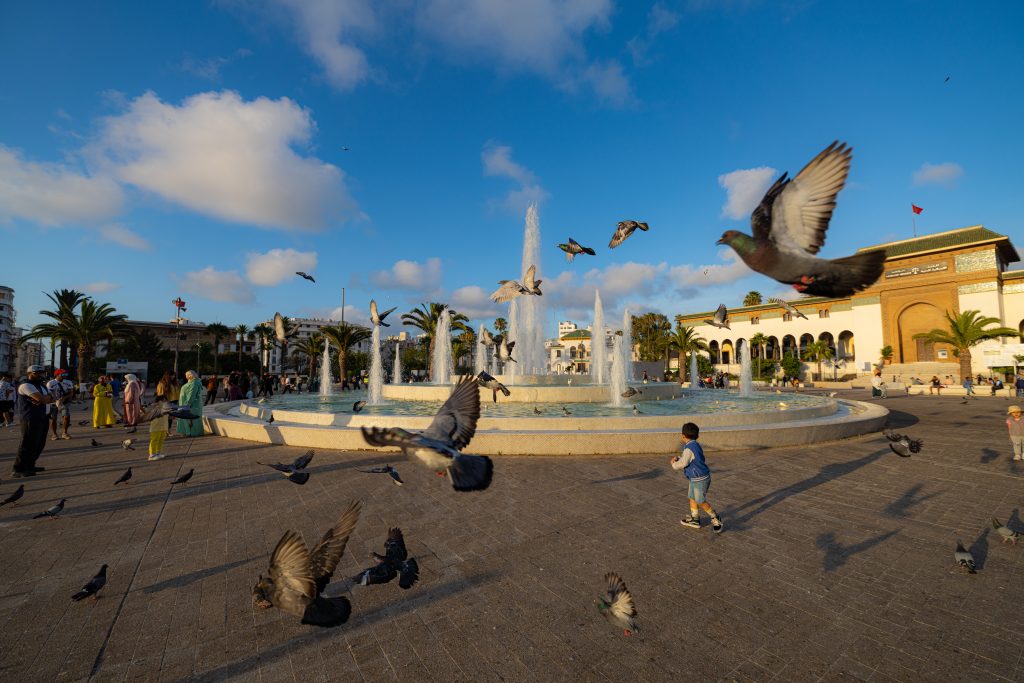
13. Leave The Drones At Home
We had both of Chris’ drones confiscated at the airport in Marrakech. Like many Muslim countries (Dubai was the last one for us), drones are strictly NOT allowed. Getting them back is challenging, and we’ve now had to pay several hundred dollars for a return flight to try and recover them.
We’ve been told you can apply for a drone license, which we have to explore later. Getting drone footage of the Sahara would be amazing.
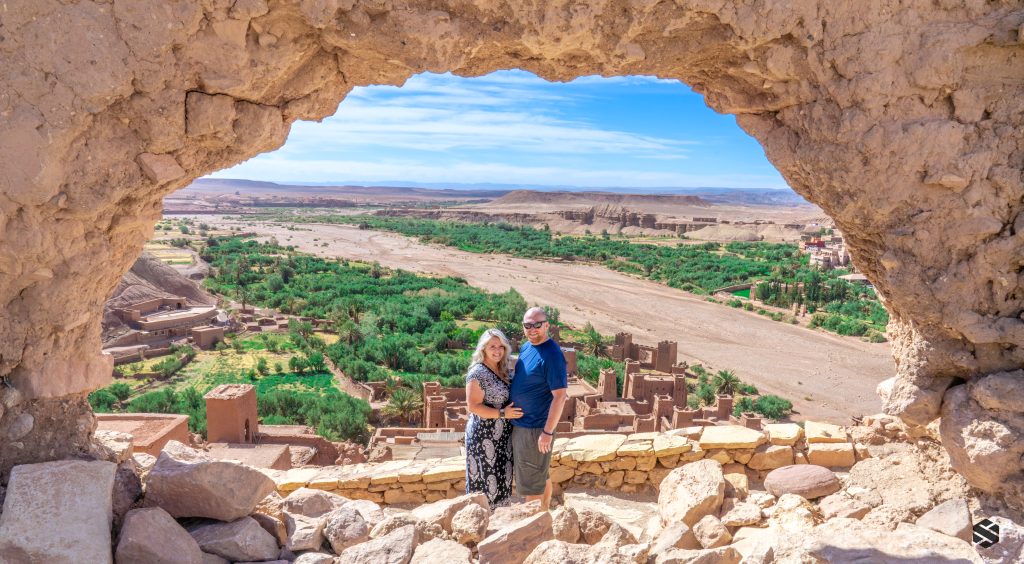
Other Interesting Facts To Know About Morocco
- Local kids attend school six days a week.
- While driving, it’s not uncommon to stop at a police checkpoint. They will ask your driver (or you) for papers, like insurance, ID, car info, etc.
- In larger cities, only a local guide is allowed. Our guide, Idir, could walk us around the smaller cities, but not the bigger ones.
- There are four imperial cities and seven royal palaces of residence. The imperial cities include Fez, Marrakesh, Meknes, and Rabat. All are visit-worthy with impressive medinas. The largest city is Casablanca, but the largest medina is Fez.
- Factory tours are often a tourist trap. We heard of a story of one person getting put into a rug shop and not allowed to leave without buying something, so be watchful! You can learn and see incredible things in these factories and shops, but you don’t want to be forced to buy.
Where To Stay On Your Visit To Morocco
Choose from these top-rated hotels:
- Sofitel Rabat Jardin des Roses
- Four Seasons Resort Marrakech
- Fes Marriott Hotel Jnan Palace
- Four Seasons Hotel Casablanca
If you’re up to staying in luxury camps, check these out:
- Sahara Magic Luxury Camp in Merzouga
- Emeraude Luxury Camp in Marrakech
- Bahba Luxury Camp near Erg Chebbi
Start planning your trip and fall in love with Morocco!
Xoxo,
Leslie
✈️ Plan and book your family’s flight to Morocco on Booking.com, Skyscanner, Kiwi.com, or Expedia
⛺ Check out luxury camps in Morocco on Booking.com, Expedia, or Vrbo, (we also love Tripadvisor)
Learn more about Morocco through fun activities from GetYourGuide, Airbnb Experiences, or Viator
Need a car? Visit Rentalcars.com
✅ Get your family’s travel insurance from World Nomads
Capture your best Morocco memories with a GoPro, Sony camera, or our favorite drones: DJI FPV, Air, and Mini
Check out other travel necessities for your trip from a comprehensive list of all the 7Wayfinders Travel Must-Haves. Click Here!

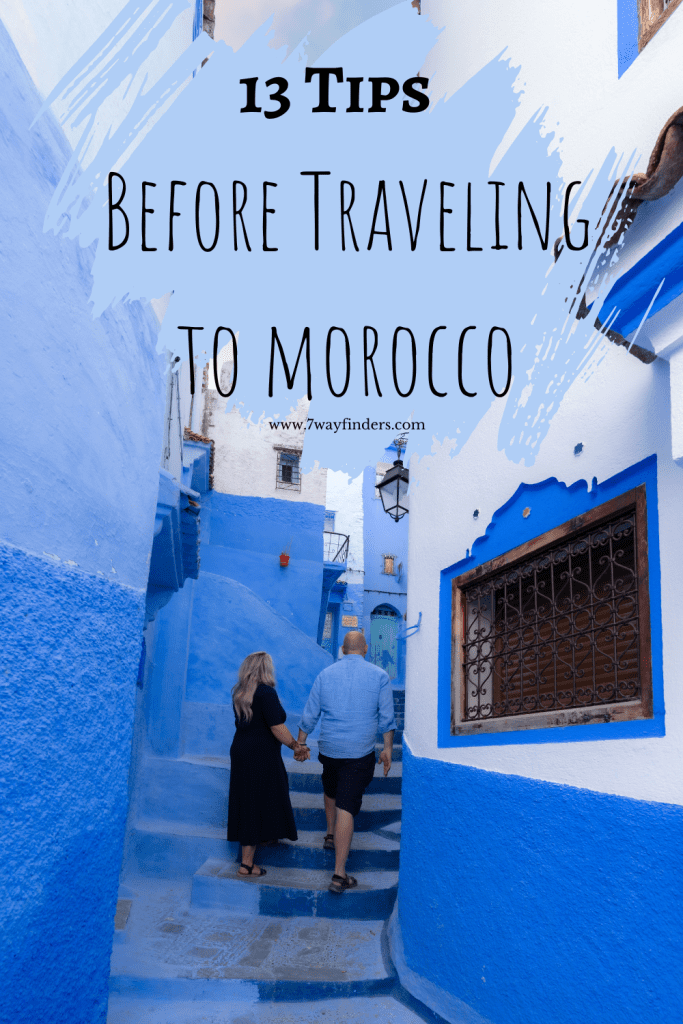
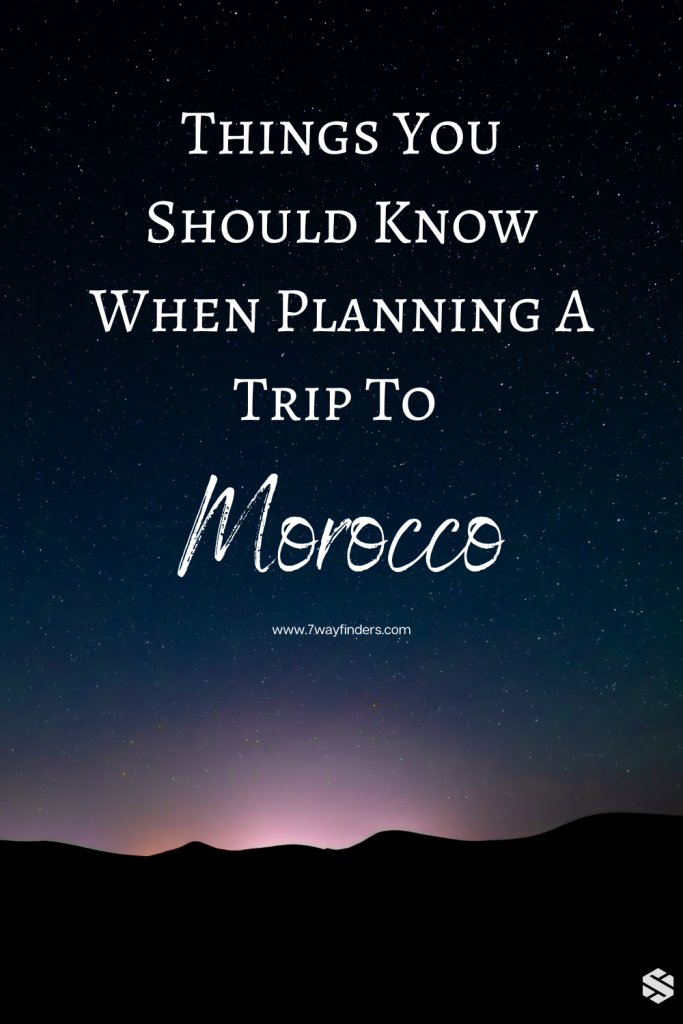
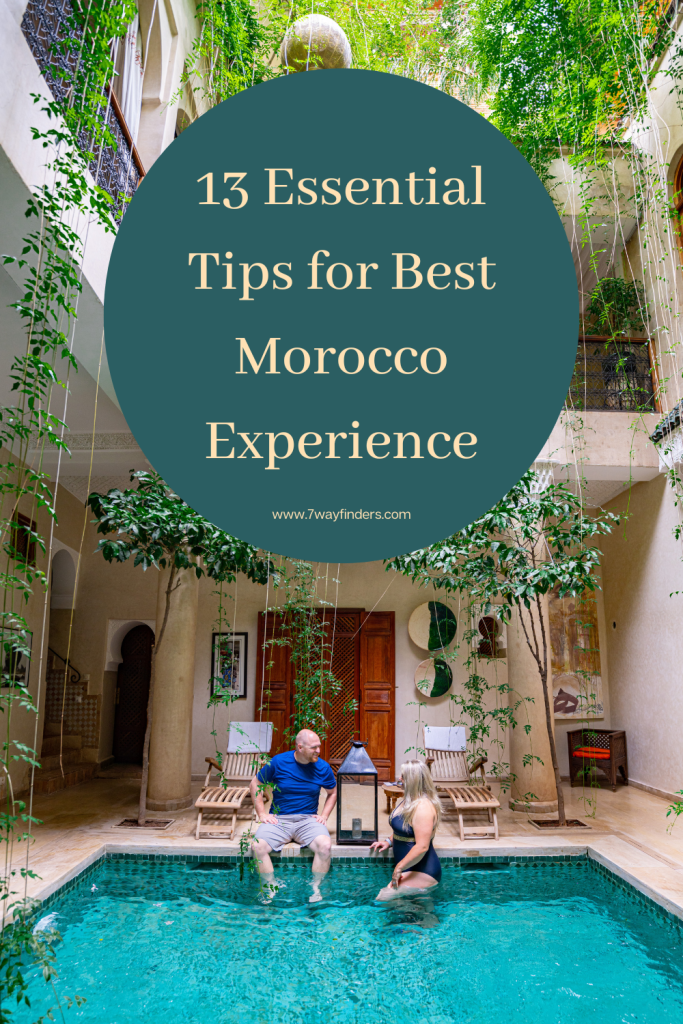
Additional Reading
15 Photos That Will Inspire Your Next Trip To Morocco
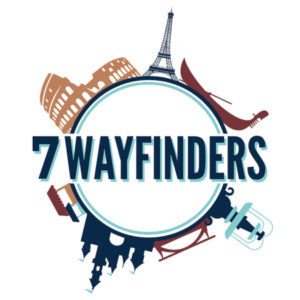
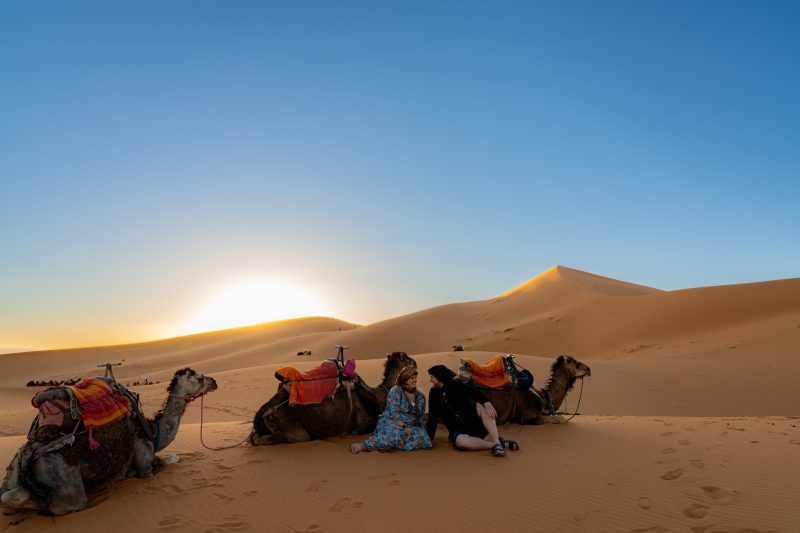
Pingback: 15 Photos That Will Inspire Your Next Trip To Morocco - 7 Wayfinders
Me and three friends of mine decided to visit Morocco in 2020 and booked a 12 Days Tour with Days Morocco Tours. Unfortunately the pandemic took place and we had to cancel our plans. Ali who organized the tour for us, was super helpful and postponed the trip. Two years later, when we contacted them again they immediately replied and adapted our plans for June 2023
The experience was amazing: I had already visited Marrakech once but was curious to spend a few days in the Desert and also go to Fes. I must say that staying at the Desert Camp that this company booked for us was crucial for our wonderful experience. The staff there served us a delicious dinner and after we all sat around a bonfire and listened (and some of us also sang!) to the berbere drums. We got to know a lot about the berber culture and made lifelong friends!
Our guide, Mohammed, who accompanied us throughout the trip, was the perfect fit for our group: cheerful, helpful and always looking out for us. During the whole time, he told us about the country’s history and took us to places we would never find on our own. We ate at very special places, where the locals eat and the food was always tasteful. Also, he was very flexible and adapted very well to our last minute change of plans!
Fes was one of my favorite places overall and our guide Adil was a delight! He showed us the different boroughs of Fes, the tanneries, the ceramic and iron workshops and talked about Al Quaraouiyine, the world’s oldest university, founded by a Tunisian woman. Other highlights were the Blue city of Chefchaouen, which is a small cozy village in the mountains and the magnificent and rich Hassan II Mosque in Casablanca.
The hotels that DaysMoroccoTours carefully picked for us were also an important factor to make this trip unforgettable, with beautiful Moroccan decoration, delicious breakfasts, welcoming staff and super well located.
I can speak for all four of us and say that company DaysMoroccoTours.com is one of the best agencies I have traveled with and it is worth every penny